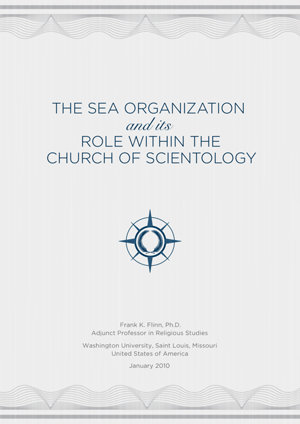ABOUT THE EXPERTISE
L. Ron Hubbard founded the Sea Organization in 1967 to assist with advanced research operations and supervise Church organizations around the world. The Sea Organization (also known as the Sea Org) is a voluntary and fraternal order entrusted to minister the advanced services of Scientology. Its members dedicate their lives in the service of the Church of Scientology and its parishioners. In this piece from 2010, Professor Frank K. Flinn examines the history, purpose, theology, mores and practices of the Sea Org by placing it within the comparative context of other religious fraternal orders, including those in Buddhism and Christianity. His positive assessment is fruitfully informed by his own past membership in the Roman Catholic Church’s Order of Friars Minor, also known as the Franciscans. As he concludes: “As in Buddhism and Christianity, the religious order of the Sea Organization serves to exemplarily preserve and promulgate the teachings and technology discovered by L. Ron Hubbard. The goal of the Sea Organization is the spiritual survival not only of its own members and members of the Church of Scientology but also humankind and the universe itself. In that, the Sea Organization is like the religious orders of the major religions of the world.”
BIOGRAPHY
Frank K. Flinn, Ph.D., (d. 2015) served as professor emeritus of religious studies at Washington University in St. Louis, Missouri, where he specialized in the study of new religions, Catholicism and church-state relations. His numerous publications include Interreligious Dialogue: Voice from a New Frontier (1998, edited with M. Darrol Bryant); Christology: The Center and the Periphery (1999); Religion in the Pacific Era (1999, edited with Tyler Hendricks); Encyclopedia of Catholicism (2007); and many articles on the academic study of religion, including several on the theology and practices of Scientology. Dr. Flinn graduated from Harvard Divinity School and received his Ph.D. in special religious studies from the University of St. Michael’s College, Toronto School of Theology. He was a Fulbright Fellow at the University of Heidelberg (Germany) from 1966 to 1967 and, over a career of five decades, taught at numerous colleges and universities, including Boston College, the University of Toronto (Ontario), Newton College of the Sacred Heart, and Maryville College. Dr. Flinn was a prolific lecturer and active member of the American Academy of Religion. Prior to his career in academia, he was a member of the Roman Catholic Order of Friars Minor, popularly known as the Franciscans.

Scientology, Social Science and the Definition of Religion
by James A. Beckford, Professor of Sociology, University of Warwick, England

Social Change and New Religious Movements
by Bryan R. Wilson,
Emeritus Fellow in Sociology, Oxford University

The Church of Scientology
by Juha Pentikäinen, Marja Pentikäinen, University of Helsinki, Finland

The Relationship Between Scientology and Other Religions
by Fumio Sawada, Eighth holder of the secrets of Yu-itsu Shinto, the oldest religion in Japan; President, Ahlul-Bait Center

The Religious Nature of Scientology
by Geoffrey Parrinder, Methodist minister, Professor, Comparative Study of Religions, University of London

Religious Philosophy, Religion and Church
by G.C. Oosthuizen, Professor of Science of Religion, University of Durban-Westville, Natal, South Africa

Scientology a New Religion
by M. Darrol Bryant, Department of Religious Studies, Renison College, University of Waterloo, Ontario, Canada

Apostates and New Religious Movements
by Bryan R. Wilson,
Emeritus Fellow in Sociology, Oxford University

Scientology: An Analysis and Comparison of its Religious Systems and Doctrines
by Bryan R. Wilson,
Emeritus Fellow in Sociology, Oxford University

The Reliability of Apostate Testimony About New Religious Movements
by Lonnie D. Kliever Ph.D., Professor of Religious Studies

The Sea Organization and its Role Within the Church of Scientology
by Frank K. Flinn Ph.D. Adjunct Professor in Religious Studies

Brief Analyses of the Religious Nature of Scientology
by J. Gordon Melton, Baylor University, Samuel Hill, Gary Bouma, Irving Hexham

Congregational Services of the Church of Scientology
by Bryan R. Wilson,
Emeritus Fellow in Sociology, Oxford University

Is Scientology A Religion?
by Alan W. Black, Associate Professor of Sociology, University of New England, Armidale, New South Wales, Australia

Is Scientology a Religion?
by Dean M. Kelley, National Council of Churches

Religious Toleration & Religious Diversity
by Bryan R. Wilson,
Emeritus Fellow in Sociology, Oxford University

Scientology A Religion In South Africa
by David Chidester, Professor of Comparative Religion, University of Cape Town, South Africa

Scientology: A True Religion
by Urbano Alonso Galan, Professor of Philosophy and Theology, Gregorian University of Rome

Scientology: A Way of Spiritual Self-Identification
by Michael Sivertsev, Moscow Academy of Sciences

Scientology: A Worshipping Community
by Lonnie D. Kliever, Southern Methodist University, Dallas, Texas

Scientology and Contemporary Definitions of Religion in the Social Sciences
by Alejandro Frigerio, Professor of Sociology, Catholic University of Argentina, Buenos Aires

Scientology and Islam an Analogous Study
by Fumio Sawada, Eighth holder of the secrets of Yu-itsu Shinto, the oldest religion in Japan; President, Ahlul-Bait Center

Scientology and Religion
by Christiaan Vonck, Rector, Faculty for Comparative Study of Religion, Antwerp, Belgium

Scientology: A Comparison with Religions of the East and West
by Per-Arne Berglie, Professor of History of Religion, University of Stockholm

Scientology Its Cosmology, Anthropology, System of Ethics and Methodologies
by Régis Dericquebourg, Professor of Sociology of Religion, University of Lille III, France

Scientology – Its Historical-Morphological Frame
by Dario Sabbatucci, Professor of History of Religions, University of Rome

Scientology: Its True Nature
by Harri Heino, Professor of Theology, University of Tampere, Finland

Scientology: The Marks of Religion
by Frank K. Flinn, Adjunct Professor of Religious Studies Washington University

